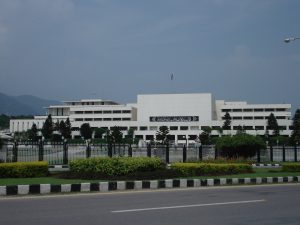Calls to improve Pakistan’s image from that of a weak economy with rising extremism and corruption to a stable, internationally responsible and progressive nation are often raised in the country’s policy making circles. However, what is conveniently ignored is that Pakistan’s ruling elite has coproduced this fragility/failed state narrative to perpetuate its hold over power. Having worked in the Pakistani policy sector for over a decade, I would like to dispel three deeply-imbedded myths about Pakistan, specific to governance.
Myth #1: Pakistan is Impossible to Govern:
For decades, Pakistan’s ruling elite has justified its poor performance by claiming that it is a country that is hard to govern and whose people are “jaahil” (savages). “It is not us but you,” is the message that the ruling elite has fed the public and also transmitted to foreign countries about Pakistan to achieve short-term personal objectives over long-term national goals. After the Cold War, this messaging included a new line of narrative, pitching Pakistan as a country with a deep level of Islamist extremism that only the “moderate minded” ruling elite could help keep at bay.
The truth is that Pakistanis are easy to govern, they have very basic demands. You cut the gas, they turn to using wood. You cut electricity, they sleep on rooftops. They have little expectations from the government beyond the primitive life needs.
As for extremism, it is less to do with Islam or the public at large and more to do with how the ruling elite sowed and cultivated the seeds of religious and ethnic extremism to pursue its domestic political and geopolitical interests, especially during the Cold War.
The Pakistani ruling elite adopted a fear-based governance model instead of a rule of law-based governance. This facilitated the flow of foreign funds into the country and secured international political support to its supposedly “liberal minded” rulers so they may “de-radicalize” the “extremist” masses.
The latest in the line of fear-based and victim-driven narrative is pitching the 140-million strong youth of the country as a “ticking time-bomb,” instead of presenting them as a game-changer to the global community in the digitalized world.
Pakistan is neither an impossible country to govern nor are the people inherently extremist. It is those in power that have hijacked the system for decades and have forced a functioning country into a dysfunctional state, keeping it deliberately on a brink of failure. It is this state of brink that creates a hyper sense of fear and victimhood, providing the ruling elite leverage with actors at home and abroad.
Myth #2: It is the Incompetence:
There is only so much that the ruling elite can blame Pakistan or its people for being hard to govern, especially 70 years after it emerged an independent country. Incompetence is simply a narrative to mask and perpetuate deep corruption.
The incompetence myth played well, both at home and abroad. It has convinced the public at home and the foreign audience that a moderate/liberal minded incompetent government is better than a worst-case scenario of an Iran like “Islamist takeover” of the country. But this begs a question; how is it that the same ruling elite that is so incompetent in governance of the state is internationally competent when it comes to its private businesses?
How is it that the national wealth has continued to decline while the combined wealth of the elite has continued to soar in the same period? The open data on the rise of wealth of key political dynasties and officials in Pakistan is a testament to bust the myth of “incompetence.” The myth only buys the ruling elite an extended period of time to rule the country due to the compassion and understanding of the public that is ready to give political leaders another chance in the hope of better results next time. The truth is, “incompetence” is only a cover for the elite to gain a perpetual hold on power.
Myth #3: The System is Complicated and Broken:
The ruling elite also uses the myth of a dysfunctional and broken system to continue its power grab on the state. The narrative on “broken system” helps the ruling elite buy sympathy and time from the public to undertake the pipedream of “reforms” and also touches the right chords with foreign powers to secure technical assistance in capacity building projects and development aid.
In reality, public sector reforms or even a serious conversation around it runs directly contrary to the interests of the ruling elite. This is why for decades successive governments have only drummed up the issue of reforms during elections and have otherwise avoided, even sabotaged any attempts to undertake governance reforms.
Having worked in the public sector for over a decade, I have seen how the same bureaucracy and systems can deliver magic when needed, and otherwise remain obsolete and redundant when required. In other words, the system is fully functioning based on what kind of incentive exists and who is pulling the levers. At the core, it is really not the system per se but the people involved in running the system that can either stunt it for political reasons or accelerate it when beneficial. To then blame the lack of reforms, broken governance structures or incompetence of officials is an easy way out of a problem that in reality does not even exist.
The conversation on Pakistan’s governance is really a dialectical relation between Pakistan’s colonial past, and its colonial present where the praetorian oligarchy replaced the British Raj as the ruling elite. In such a system, democracy has been an exercise in rotating power between the ruling elite; accountability – a friendly game of restraint; and the myth around governance, incompetence and extremism – a powerful weapon to perpetuate power through a sense of fear, victimhood and near-failure.
In short, Pakistan needs to be saved from those that rule it, and especially from those that want to rule it forever.

































